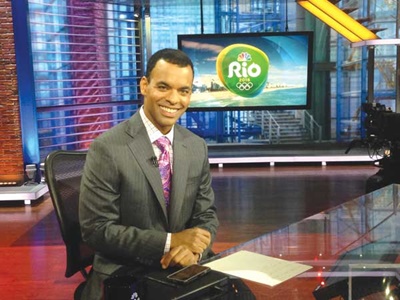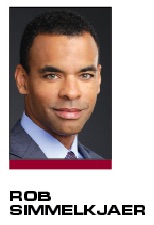It’s a common occurrence for me. Someone I’ve known only in the context of doing business together will text or email me, “Rob, did I just see you on television?’
Yes, you did.
It’s unique. It’s unusual. It’s sometimes quite difficult. But it has been my career for the last 10 years: A sports media executive who moonlights on the air.
I’m constantly asked, “How did this happen? How do you pull off what seems like not just one but two dream jobs at once?”
The answer in short is that I have no idea. I’ve been lucky. I’ve had tremendous support from a number of bosses who could have easily just said “no.” And sure, I’ve been blessed with just enough talent to be able to pull it off.
Being on the air was my first real love. I called my first game (hockey) on WDCR radio as a freshman at Dartmouth College, and it was love at first mike. I loved the adrenaline rush from calling a 2-on-1 break. I relished traveling with the team and interviewing the coaches. And yes, like most talent, I adored the sound of my own voice.
 |
Rob Simmelkjaer on set of NBC Sports’ studio in Stamford, Conn.
Photo by: NBC SPORTS GROUP
|
After four years of college radio and internships at CBS Sports and ABC News, I found myself on the well-traveled path from law school to a big corporate law firm. But I knew that world wasn’t for me, and with the help of my former boss from my CBS Sports internship (Len DeLuca), I landed a job as a director of programming at ESPN. The job had nothing to do with being on the air, but at least it was in the industry in which I aspired to have a career.
The itch to get in front of the camera never went away, though. When, one day, I sheepishly told ESPN’s head of production and programming, Mark Shapiro, that I had dreams of being on the air, he reacted with his typical, impossibly high, positive energy: “I love this! Let’s get you an audition tape!” And so it began.
Around that time, ABC News was starting a digital channel called ABC News Now. The audience and the stakes were low, which was why I felt comfortable asking David Westin, ABC News president and another mentor of mine, whether he would be willing to give me a shot. By then I had been promoted to working directly for ESPN President George Bodenheimer as vice president and special assistant, and George was kind enough to allow me to run over from 77 to 47 West 66th Street every day, throw on some makeup, and jump in the anchor chair.
One of my favorite stories from those early days occurred while George was on vacation. ABC News Now was meant to be a hip and cool digital channel (before its time in a way), and neckties were a no-no. One of the few places we had TV distribution was at Disney World (corporate synergy at its best), where George was vacationing with his family. As I got off the air from one of my shows, my cellphone rang and it was George, telling me he and his entire family had watched me from their hotel room in Orlando.
“Nice job Rob, but I have three words for you: V. Neck. Undershirt.”
I guess the crew neck peeking out from the tie-less shirt didn’t add much to my journalistic gravitas. I’ve never made that mistake again. Thanks, George.
From there I went on to work full time at ABC News for a while, and I had some amazing experiences (interviewing The Edge of U2 before the first Saints game post-Katrina) and some gut-wrenching ones (anchoring live coverage of the Virginia Tech mass shooting, talking live to college students who had just seen their classmates killed).
But the lure (and better business model) of sports brought me back to ESPN. While working for Russell Wolff as the head of international business development, I moonlighted doing play-by-play on ESPNU, sidelines on ESPN2, and studio shifts on ESPNews. One of the nicest things anyone has ever said to me was my once-and-now-current colleague Mike Tirico telling me he watched me in a hotel room while on the road, and said “Wow, you can actually do this.”
It was in coming to NBC, however, that all the time I had put in as this two-headed media monster really bore fruit. Thanks to Mark Lazarus, Sam Flood and Jim Bell, I’ve had the opportunity to do amazing things. I made my network debut in 2011 doing weekend updates on NBC. This summer marks my second opportunity to be a part of the greatest show in sports television, the Olympic Games, as the studio host of our coverage on MSNBC. In a twist of irony, my last major business assignment at ESPN was leading a bid against NBC for the rights to the 2014 and 2016 Olympics. I’m sure glad that didn’t work out.
I’ve also been asked to contribute to coverage of important stories involving the world of sports on the “Today” show, MSNBC and CNBC. I even had a chance to reunite with my first true love when I hosted a weekly show on NBC Sports Radio, a network I helped create.
So what have I learned from all this?
First and foremost, that being on the air is really hard. Executives sometimes fail to appreciate just how exposed their talent is every single time that red light goes on, especially in the generally live world of sports television. When something goes wrong, it might have been some producer or director’s fault, but all anyone at home will see is a fumbling talent.
Second, being great requires tremendous dedication and attention to detail. I’ve been able to hold my own as a part-timer, but the path from good to great requires a lot more than talent. Great focus and dedication to the craft is something that all the great ones, from Costas to Scully to Tirico to my dear departed friend, the great Stuart Scott, all share in common.
Finally, I’ve realized just how hard it is to straddle two worlds. People have an innate need to categorize others, and failing to fit neatly into the bucket of “executive” or “talent” can certainly bring its challenges. The question I get most often is “What do you really want to be?” As if there must be a simple answer. The answer, like so many in life, is “It all depends.” But for now, I’m perfectly happy to be an executive who gets to dabble in the on-air world.
If someone had told that kid on the radio at Dartmouth that he would someday get to broadcast the Olympics and be an executive at NBC Sports, he probably would have asked “Wait; don’t I have to pick one?” I’m incredibly lucky that I haven’t. At least, not yet.
Rob Simmelkjaer is senior vice president of NBC Sports Ventures. During Rio 2016, he serves as studio host on MSNBC’s Olympic coverage.





